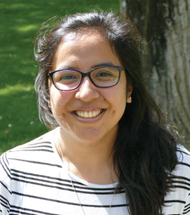Evaluar la competencia parental en la educación de los hijos adolescentes
Gabriela Pilar García Zavala realiza su TFM sobre estas cuestiones en el Máster en Investigación en Ciencias Sociales, que cursa gracias a una beca del Social Trends Institute

FOTO: Cedida
El papel de los padres en la educación de sus hijos es fundamental. Sin embargo, ¿es posible diagnosticar si se está desarrollando de forma adecuada? Gabriela Pilar García Zavala, estudiante de la segunda promoción del Máster en Investigación en Ciencias Sociales (MICS), profundiza en estas cuestiones en su Trabajo Fin de Máster (TFM).
De origen peruano y graduada en Psicología por la Universidad Católica de San Pablo (Perú), Gabriela cursa el itinerario de Educación y Psicología del MICS gracias a una beca del Social Trends Institute. En su TFM busca validar la Escala de Educación Familiar para Adolescentes en su versión para hijos (EEFA-VH). La herramienta fue desarrollada por Charo Reparaz y Aurora Bernal, profesoras de la Facultad de Educación y Psicología de la Universidad de Navarra. A través de este instrumento, es posible evaluar la competencia parental general, la autoridad parental y la educación en valores de los adolescentes.
Según la estudiante, un diagnóstico claro de cómo se está desarrollando la educación puede permitir “detectar la presencia de algún problema y proponer una adecuada intervención”. Esto cobra especial interés en su campo de trabajo en la Universidad Católica de San Pablo, donde se ha centrado en proyectos de investigación relacionados con la violencia familiar y la resiliencia en adolescentes.
“En mi trabajo, vi que necesitaba conocimientos en métodos de investigación que fueran más allá de la psicología para comprender mejor la realidad del mundo actual –expone– Y así es cómo entré en el MICS”.
Conocimientos teóricos y prácticos y experiencias personalesGabriela realiza esta investigación gracias a los conocimientos adquiridos en sus estudios del MICS. “Los cursos de teoría social nos dieron las herramientas necesarias para reflexionar sobre la realidad social actual e identificar sus problemas”, afirma. Por otro lado, también le han sido muy útiles las materias de metodologías de investigación donde ha adquirido conocimientos sólidos para empezar a investigar.
Además, añade que el máster ha resultado una experiencia muy positiva, ya que “escuchar a otros estudiantes de otras disciplinas y países enriquece mucho la experiencia interdisciplinar”.
Estudiar en la Universidad de Navarra también le ha permitido iniciarse en la vida investigadora. La estudiante participó en el XV Foro Internacional sobre la Evaluación de la Calidad de la Investigación y de la Educación Superior (FECIES) donde presentó la comunicación ‘Propuesta de evaluación del proyecto Tuning en Latinoamérica mediante el método Delphi’ (página 368) junto a los profesores de la Facultad de Educación y Psicología Erika Egleontina Barrios González y Ángel Sobrino Morrás.
El MICS, un título acreditado por la ANECAEl MICS está coordinado por el Instituto Cultura y Sociedad (ICS) y cuenta con la colaboración directa de las facultades de Comunicación, Derecho, Educación y Psicología, Enfermería, y Filosofía y Letras. Está acreditado por la ANECA (Agencia Nacional de Evaluación de la Calidad y Acreditación).
Social Trends Institute (STI) es una fundación sin ánimo de lucro, con base en Nueva York y delegación en Barcelona. Su misión es contribuir a entender las tendencias sociales, de más impacto en el mundo de hoy, a través de la investigación y de un debate abierto entre expertos de diversos campos del saber. STI promueve y difunde trabajos de investigación de carácter interdisciplinar e internacional dentro de cinco grandes grupos: Matrimonio y Familia; Bioética y Biotecnología; Cultura y Estilos de Vida; Gobierno y Sociedad Civil.





